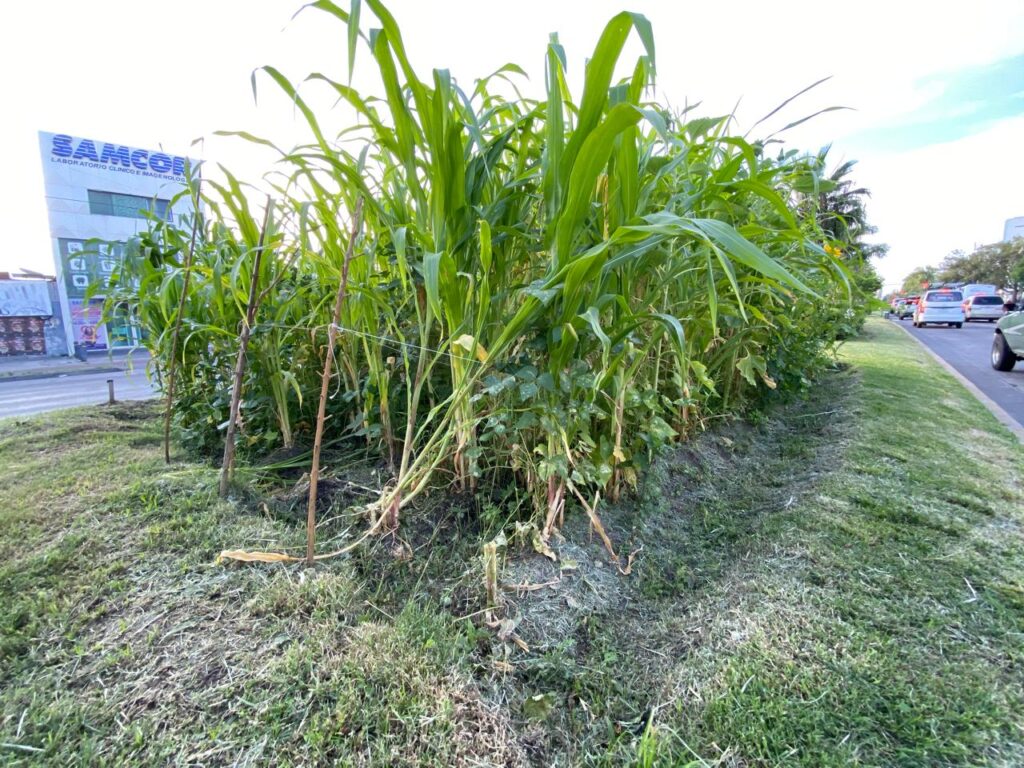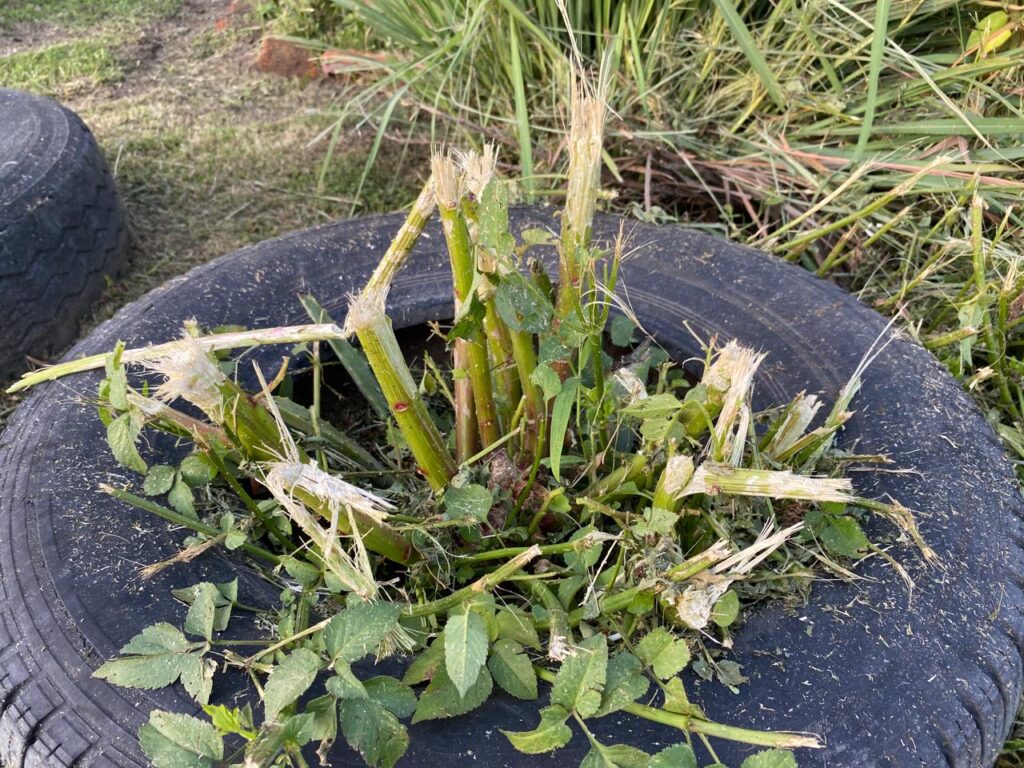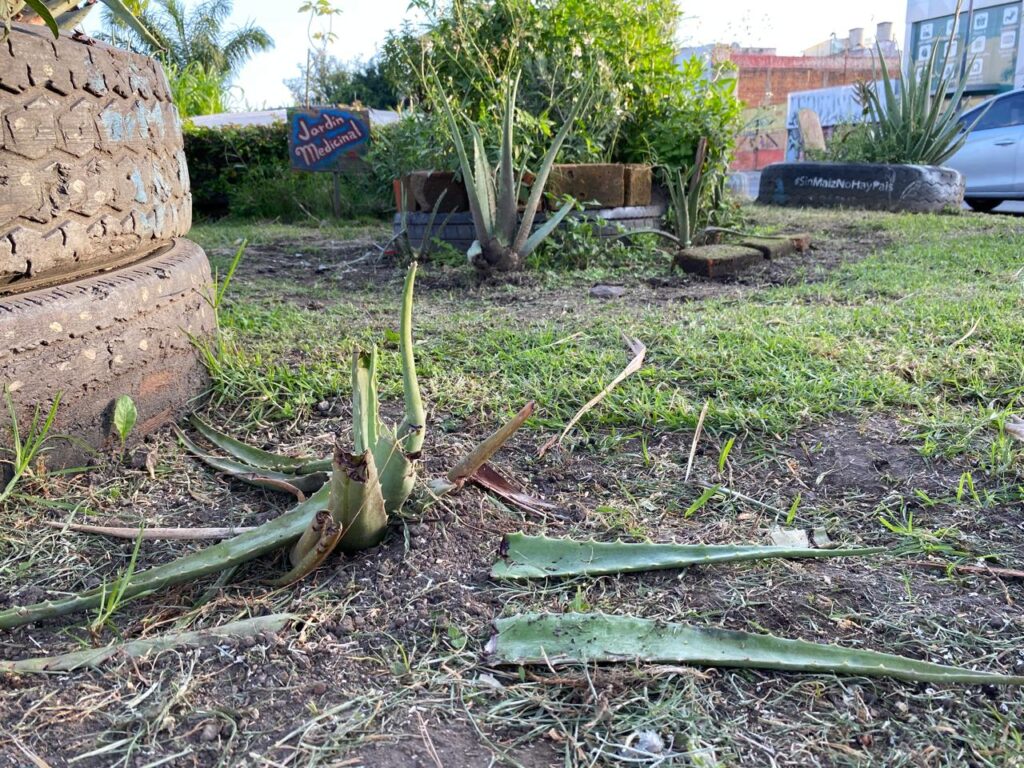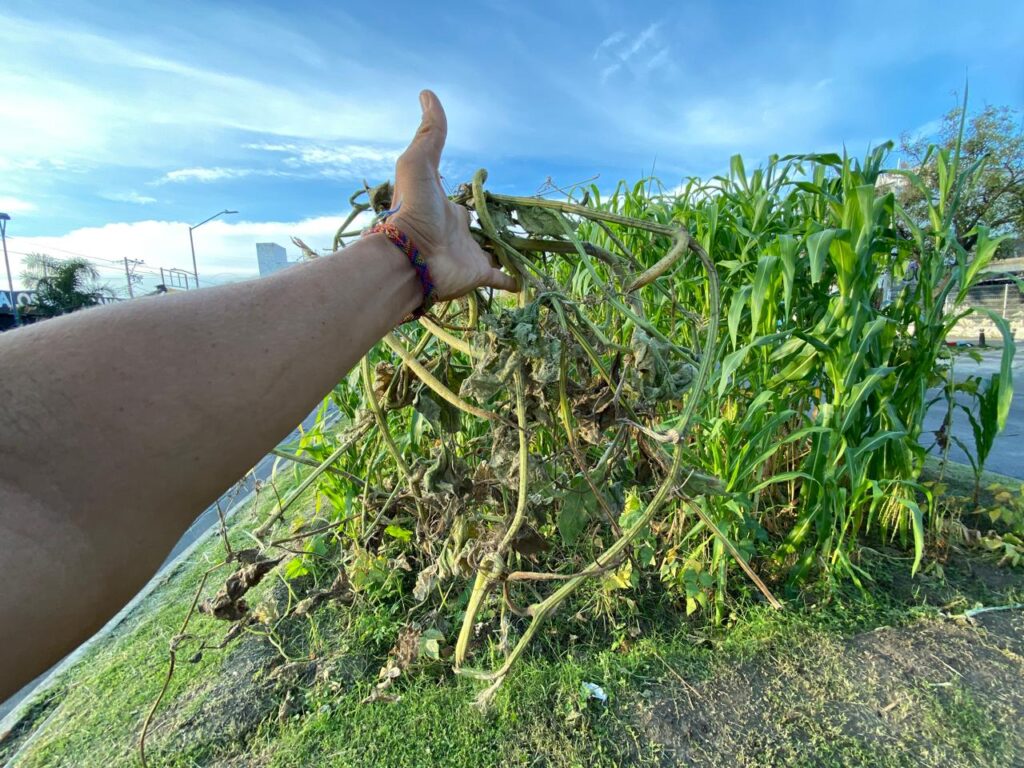At the corner of Avenida Federalismo and Francisco Zarco, a small plot of earth has become a symbol of agroecological resistance. Known as Coamil Federalismo, this community agroecological space transforms one of Guadalajara’s busiest avenues into an oasis of food, medicine, and memory. It’s not just a garden — it’s a living classroom, a sanctuary for biodiversity, and a statement of sovereignty.
But on Oct. 2, this oasis was struck again. Stalks of maize and vines of squash — the heart of Mexico’s ancestral milpa — were sliced through, fruit trees damaged, medicinal herbs trampled. Hoses were cut and connectors stolen. It was the latest in a series of attacks that the collective says have followed a disturbing pattern, often coinciding with municipal maintenance of nearby medians.
“¡No es pasto, es milpa!” the collective insists. “It’s not grass — it’s food, medicine, and life.”
Para leer esta historia en Español ir a “No es pasto, es milpa”: Defendiendo la vida en la Avenida Federalismo

What is the Coamil Federalismo?
The Coamil Federalismo is one of Guadalajara’s pioneering agroecological commons, created in 2016 by neighbors, environmentalists, and cultural workers. The name coamil comes from the Náhuatl word for cultivated field, and the group’s mission has been to reclaim public space as living soil, not ornamental turf.
Planted in the central median of Avenida Federalismo — a long, central artery that cuts through the city — the coamil stands in between six lanes of whizzing traffic. In this space, corn, beans, squash, sunflowers, and amaranth are cultivated, as well as medicinal plants such as marigold, rosemary, sage, and lavender; fruit trees such as papaya and lemon; and a wide variety of pollinator species, transforming a stretch of land that was once grass into a beacon of life, community, and urban regeneration.

Violence Against the Green
This week’s attack came just two days after the 5th Annual Fiesta del Maíz, when the collective gathered hundreds of residents to celebrate native corn and traditional milpa systems with workshops, music, food, and ceremony.
The destruction was a blow — symbolic and physical. Yet the collective has chosen to respond not with anger, but with perseverance.
“If the root is ignorance,” they wrote in their Oct. 3 communiqué, “we share knowledge. We are guardians of ancestral memory that unites us with the Earth.”
The Coamil has faced repeated vandalism this year — April 15, July 30, August 13, and September 7 — each time damaging crops or irrigation systems. Although the group does not directly accuse any party, the timing often coincides with municipal mowing or trimming. On the same day of the October 2 attack, members had asked city workers to take care near the milpa. Hours later, the plants lay in pieces.

Seeds of Hope and Resistance
Despite the repeated losses, the Coamil’s members remain steadfast. They continue to plant, compost, save native seeds, and welcome volunteers and students to learn about agroecology, soil care, and the importance of biodiversity.
“We work — and resist — with the conviction that another way of inhabiting and caring is possible,” they write. “Before their violence, our right to exist.”
Their message echoes far beyond Guadalajara, resonating with community gardens, Indigenous seed keepers, and defenders of land across the Americas who insist that care for the soil is an act of resistance.
“Let’s make milpa. Let’s sow community.” 🌽💚
For more information about Coamil Federalismo or to join their weekly workdays, follow their Facebook page or Instagram.

- A Year of Listening, Resistance, and Hope: Reflections from The Esperanza Project - December 30, 2025
- Arts to Breathe: A Continental Act of Dignity - November 28, 2025
- “It’s not grass, it’s a milpa”: Defending Life on Avenida Federalismo - October 8, 2025
Assholes. That just makes my blood boil.
IKR? See previous comment for another take on it… our cheerful guerrilla garden warriors are gearing up for their 10th year, so they’re in it for the long haul!
This makes me cry. As someone who has fallen in love with plants and the work of building biodiversity where I’m at, I cry with frustration and grief at the destruction of the plants and infrastructure. As a person who knows I have a lot to learn about being the change I wish to see, I weep with gratitude at the story of loving persistence and commitment to kindness in the face of ignorance. Thanks for sharing this story.
Thank you, Trina. Indeed the folks of Coamil Federalismo are among the best examples I’ve seen of cheerful, creative resistance. Their kind yet persistent advocacy is really a far-reaching educational process for everyone from passersby to city employees. ¡Viva Coamil Federalismo!